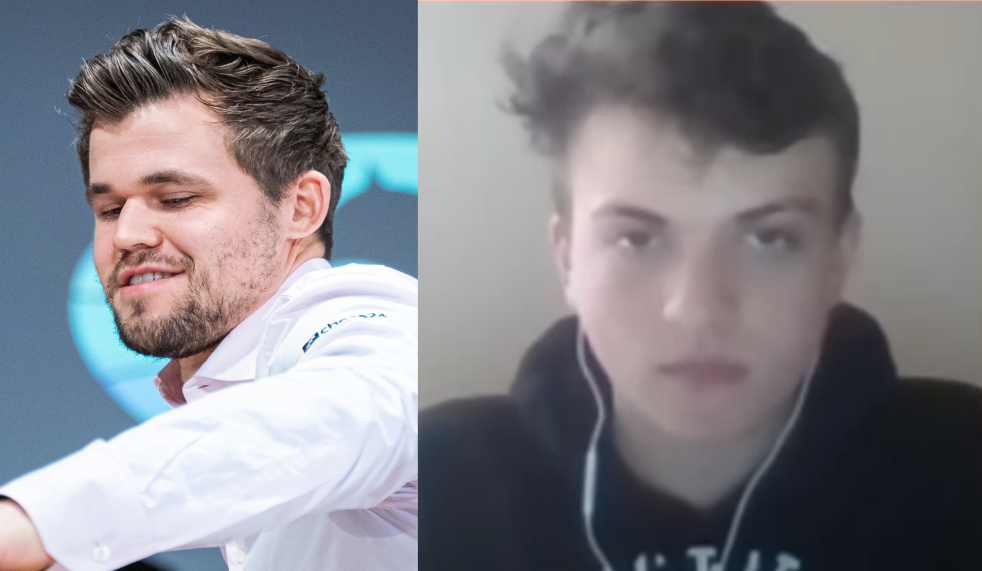3 minutes
Humans vs. Machines: The End for Competitive Chess
Please be aware that the views expressed in this poste are solely those of the author and do not represent the official stance of any chess federation or organization.
The world of competitive chess has witnessed a seismic shift in recent years. The traditional clash between human grandmasters has now been joined by an unexpected contender: artificial intelligence. As machines continue to evolve, the question looms large: Is this the end of an era for human supremacy in chess?
In this article, we delve into the fascinating rivalry between two exceptional players: World Champion Magnus Carlsen and rising star Hans Niemann. Their encounters on the board have captivated fans, sparked controversies, and raised fundamental questions about the future of the game.

Magnus Carlsen and Hans Niemann. The two players involved in the controversy. Lennart Ootes, CC BY 4.0. (Carlsen), St. Louis PRO Chess League, CC BY-SA 3.0
The Rise of Magnus Carlsen
The Chess Prodigy
Magnus Carlsen burst onto the international chess scene like a comet. His prodigious talent was evident from an early age, and he quickly climbed the ranks. His intuitive understanding of positions, relentless work ethic, and unyielding will to win set him apart. In 2013, he achieved the ultimate pinnacle: becoming the World Chess Champion.
The Reign of Carlsen
Carlsen’s reign has been marked by a unique blend of creativity, precision, and psychological warfare. His mastery of endgames, ability to grind out wins, and uncanny intuition have left opponents bewildered. His famous “Carlsen grind” is a testament to his tenacity—a slow, methodical squeeze that breaks even the most resilient defenses.
The Machine Challenge
But then came the machines. Deep Blue, Stockfish, AlphaZero—the silicon adversaries that threatened to dethrone human champions. Carlsen faced these digital opponents head-on, participating in man-versus-machine matches. His resilience was admirable, but the gap between human and machine seemed to narrow inexorably.
The Emergence of Hans Niemann
The American Prodigy
Enter Hans Niemann, a young American with fire in his eyes and a hunger for victory. Niemann’s rise has been meteoric. His tactical acumen, fearless play, and audacity against established grandmasters have turned heads. And it was during the 2022 Sinquefield Cup that he etched his name into chess history.
The Sinquefield Sensation
In a matchup against none other than Magnus Carlsen, Niemann caused seismic waves. The world champion, perhaps underestimating his opponent, found himself outplayed. Niemann’s smooth maneuvers and unwavering clock management left Carlsen scrambling. And when the chance arose, Niemann seized it—a victory that reverberated through the chess world.
The Controversy
Carlsen’s withdrawal from the Sinquefield Cup after losing to Niemann sparked controversy. Was it a tacit accusation of cheating? The chess community debated, but Niemann remained undeterred. His audacious play had disrupted the status quo, and the machine-human balance trembled.
The Endgame
A New Paradigm
As we witness the clash of titans—Carlsen’s experience against Niemann’s fearlessness—we realize that chess is evolving. Machines analyze billions of positions per second, but humans bring intuition, creativity, and emotion to the board. Perhaps the future lies in a harmonious blend—a symbiosis where humans guide the machines, and machines elevate human play.
The Final Move
So, is this truly the end for competitive chess as we know it? Not quite. The battle rages on, and the pieces dance across the 64 squares. Magnus Carlsen and Hans Niemann—their names etched in chess lore—are the vanguards of this new era. As the clock ticks, we await the final move—the one that will define the future of our beloved game.
chess stockfish competitive chess Carlsen–Niemann Sinquefield Cup cheating in chess
582 Words
2022-09-21 08:06